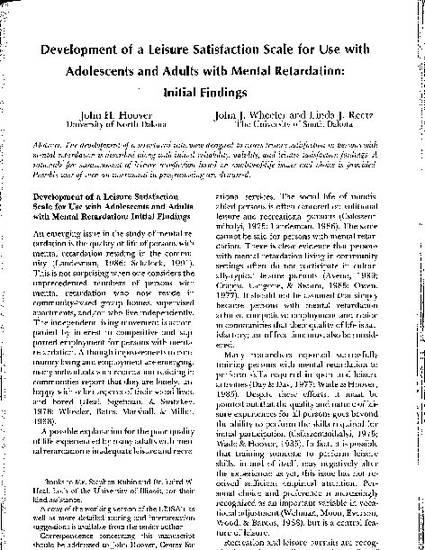
Article
Development of a Leisure Satisfaction Scale for Use with Adolescents and Adults with Mental Retardation: Initial Findings
Education & Training in Mental Retardation
(1992)
Abstract
Investigated the psychometric properties of a structured interview for assessing leisure satisfaction in mentally retarded persons. The Ss were 40 persons (aged 21–66 yrs) with developmental disabilities and a contrast group of 20 college students. Between-item correlations suggested that the interview constituted a unitary scale. The internal-consistency reliability of a scale made of all 33 items was .73. Interrater reliability was 97.35%. Items that did not correlate with the total scale tended to be those associated with general leisure satisfaction, whereas items referring to specific activities tended to correlate with the total scale. Items reflecting specific pursuits made up the best index of overall satisfaction. Only 20% of the retarded Ss said they had enough friends. Dissatisfaction on activity items always resulted from a desire to participate more often.
Keywords
- leisure satisfaction scale,
- adolescents,
- mental retardation,
- developmental disability
Disciplines
Publication Date
June 1, 1992
Publisher Statement
© Division on Autism and Developmental Disabilities. This document was published with permission from the publisher. It was originally published in the Education and Training in Mental Retardation.
Citation Information
John H. Hoover, John J. Wheeler and Linda J. Reetz. "Development of a Leisure Satisfaction Scale for Use with Adolescents and Adults with Mental Retardation: Initial Findings" Education & Training in Mental Retardation Vol. 27 Iss. 2 (1992) p. 153 - 160 ISSN: 1042-9859 Available at: http://works.bepress.com/john-wheeler/40/
